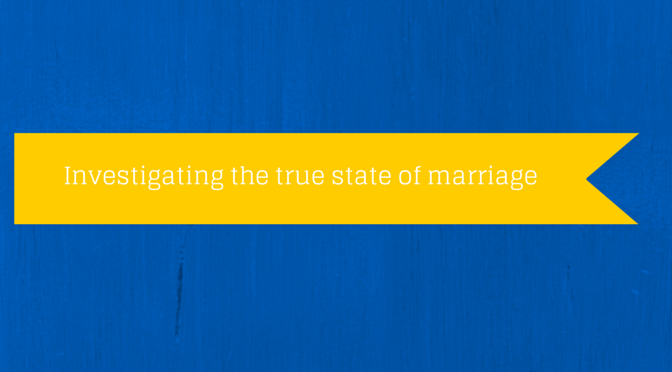Calling for a Correction
Anyone who has read The Good News About Marriage, or heard me talk about it, knows that the thickets of marriage and divorce data are really dense and complicated. Even though complex numbers are my field, I ventured into the deep forests of this data years back with trepidation, sure that at some point I would end up in quicksand–which for an analyst means misunderstanding something, and making an embarrassing mistake. Sure enough, I just did.
Two weeks ago, I wrote a quick analysis blog titled “Record Share of Americans Have Never Married – Really?” about the fact that a recent PEW report title was overstating the “never married” thing since, I thought, it was analyzing people still unmarried by age 25, when the median age of marriage was 27. It just came to my attention today that somehow, either I misunderstood the age boundary, or I was analyzing a slightly different report, or something changed, because clear as day (today) is the fact that this particular PEW report does include people over the age of 25. I went back to the original URL I was looking at (which I saved) but the link no longer works, so I can’t examine what I was looking at before, to know if something changed. And given the rigor PEW puts behind all of their research, and that it is rare in the research arena for a report to be re-issued with new data, it is far more likely that I simply misunderstood something.
Regardless, it is clear that my old analysis no longer applies.
I’m taking down my previous analysis, of course, but I didn’t think that was sufficient. The whole point of me diving into this area of marriage and divorce analysis over the last few years is to get the TRUTH out and counter the myths, urban legends and bad data that spread like crazy over the internet. So if I have made an error – for whatever reason – and shared it with others, I need to publicly say that and correct the record.
I also need to be sure this doesn’t happen again. Most likely, instead of trying to get a quick analysis out in order to equip leaders to respond to breaking stories and headlines, I’ll need to allow time for a second researcher to look at the issue, and double-check my analysis. The importance of multiple reviewers was why Tally Whitehead, my senior researcher, and I worked so closely together and got so many other researchers to look at The Good News About Marriage data and conclusions before we released it. So although I don’t want to slow down my responsiveness to ongoing news too much, I want to be SURE that going forward, I don’t release avoidable mistakes either.
In the meantime…. mea culpa. I’m embarrassed and a bit frustrated that, yep, the quicksand finally found me.

